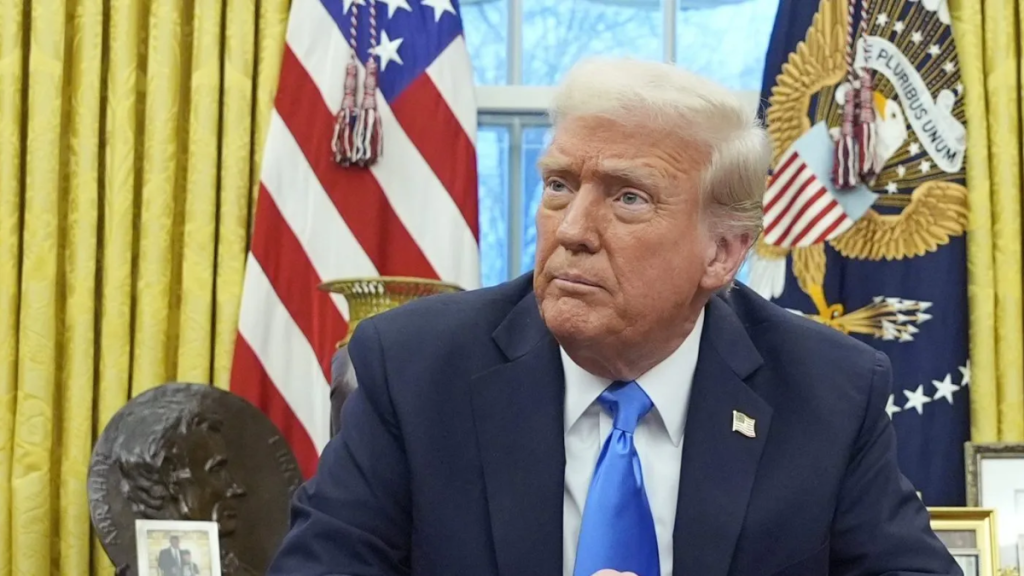As former President Donald Trump pushes forward with his aggressive tariff strategy heading into the 2024 presidential election, top Republican leaders like House Speaker Mike Johnson and Senate Minority Whip John Thune are sticking firmly by his side — even as economists and some GOP lawmakers raise alarms about the potential consequences for American consumers and the broader economy.
The move highlights the increasingly delicate balance Republican leadership is trying to strike: aligning with Trump’s populist economic message while managing internal party divisions and rising concerns about inflation and trade retaliation.
Trump’s Tariff Proposal Sparks Political and Economic Controversy
Trump’s recent proposal to impose a 10% universal tariff on all imports and a 60% tariff on Chinese goods has stirred significant controversy.
Critics argue that the move could spike prices on essential goods, disrupt supply chains, and damage relationships with key trading partners. But Johnson and Thune have not broken ranks, signaling their continued support for the GOP frontrunner’s economic vision.
According to Politico, Johnson views Trump’s tariff revenue as a funding source for new tax cuts and a lever to finance future conservative policies.
Despite the backlash, Johnson reportedly told GOP members that working with Trump is essential for the party to push forward its 2025 legislative goals, particularly on tax reform and border security.
John Thune’s Cautious Alignment
While Johnson’s support appears strategic, Sen. John Thune has taken a more measured stance. Thune has warned that sweeping tariffs could serve as “a recipe for increased inflation,” particularly during a time when families are still recovering from the economic aftershocks of the COVID-19 pandemic.
However, Thune has not openly defied Trump. Instead, he has chosen to work within the party framework, advocating for more targeted trade penalties — especially toward countries like China — while avoiding direct confrontation with Trump’s broader economic rhetoric.
In a statement to South Dakota Searchlight, Thune emphasized the need for smarter trade policies: “Broad tariffs can drive up costs for consumers. We should focus on where unfair trade practices actually exist.”

The GOP’s Internal Struggle Over Trade
Behind the scenes, there’s growing tension within the GOP over how far to go with Trump’s protectionist trade policies.
Many Republicans still identify with traditional free-market principles and fear that blanket tariffs could hurt small businesses, raise consumer prices, and prompt retaliation from global partners like the European Union or Mexico.
Despite this, Johnson and Thune seem to believe that supporting Trump is essential for party unity ahead of the 2024 election. With Trump holding significant sway over the Republican base, any challenge to his platform could risk dividing voters and undermining Republican chances in November.
As AP News reports, Republicans in Congress technically have the power to override tariffs, but many are hesitant to do so with Trump as the presumptive nominee. “There’s just not a lot of political will right now to push back publicly,” one anonymous lawmaker told the outlet.
Tariffs and the 2024 Election Strategy
From a political perspective, tariffs remain a powerful tool for Trump to rally his base. Many of his supporters, particularly in Rust Belt states, view tariffs as a necessary step to protect American jobs and reduce dependence on foreign manufacturing.
For Johnson, who is working to maintain control of the House in 2025, embracing Trump’s messaging may be more about electoral calculus than economic consensus.
By standing beside Trump, he ensures continued support from MAGA-aligned lawmakers while securing promises that Trump will endorse key pieces of GOP legislation if re-elected.
Thune, meanwhile, may be playing the long game — voicing concern to protect his reputation among traditional conservatives without alienating Trump or his supporters.
His cautious approach positions him as a stabilizing force within the party, one who might be pivotal in post-election policy debates.
Conclusion: A Calculated Alliance
The alliance between Trump, Johnson, and Thune on trade policy illustrates the evolving nature of the Republican Party.
As the GOP becomes increasingly shaped by Trump’s economic nationalism, even veteran lawmakers who privately hold reservations are aligning themselves with the former president to avoid internal conflict and preserve political capital.
For now, it appears that tariff turmoil won’t fracture GOP leadership — at least not in public. But as the economic effects of these policies begin to surface, and as election season heats up, Johnson and Thune may face increasing pressure to reconcile party loyalty with broader economic responsibility.
Disclaimer – Our team has carefully fact-checked this article to make sure it’s accurate and free from any misinformation. We’re dedicated to keeping our content honest and reliable for our readers.
